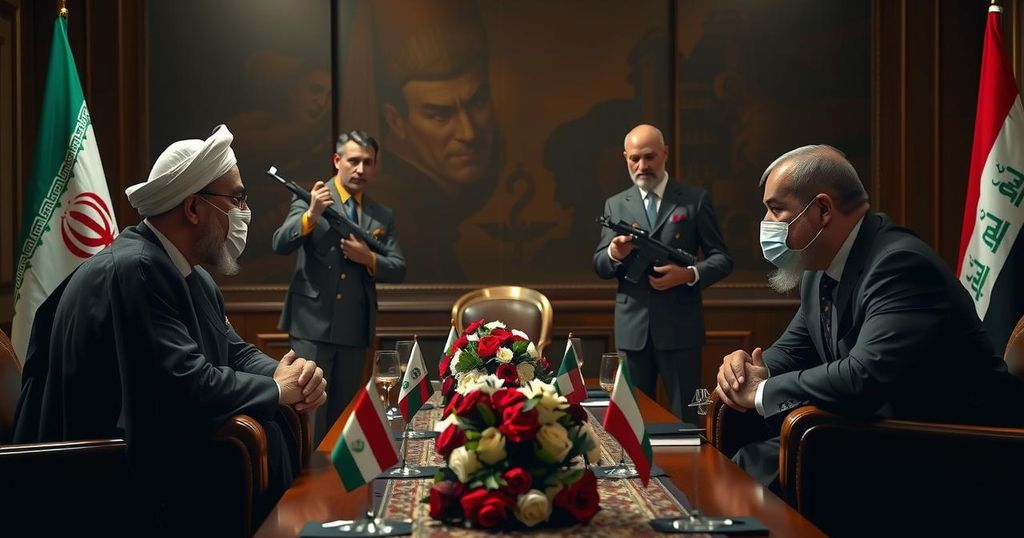Iran’s Foreign Minister Abbas Araghchi met with Iraqi National Security Advisor Qasim al-Araji, along with Quds Force head Ismail Qaani, to discuss deepening security cooperation. Both nations affirmed that Iraq’s security is intertwined with Iran’s, aiming for a bilateral agreement. Concurrently, Iranian officials addressed regional tensions at talks in Kazakhstan regarding Syria, particularly focusing on Israeli military actions.
Iran’s Foreign Minister Abbas Araghchi engaged in discussions with Iraq’s National Security Advisor Qasim al-Araji in Tehran, a meeting showcased in state media photos. Concurrently, Ismail Qaani, head of the Quds Force, was also seen meeting Araji, underscoring Iran’s focus on strengthening connections with Iraq through both Iranian Revolutionary Guard Corps (IRGC) channels and diplomatic initiatives. This diplomatic push occurs amid ongoing tensions in the region, including drone attacks claimed by Iraqi militias against Israel. During their meeting, both officials emphasized the significance of enhanced security cooperation between Iran and Iraq, arguing that it would bolster bilateral relations, particularly economic ties. “We consider Iraq’s security as Iran’s security, and we hope that with the full implementation of the security agreement, sustainable security would be established in the border areas of the two countries,” asserted Araghchi, reflecting Iraq’s role in Iran’s strategic interests. The discussions also touched upon a recent visit by Iranian President Pezeshkian, with intentions to finalize a bilateral agreement aimed at consolidating security and counter-terrorism measures. In support of this, Iraqi officials reaffirmed their commitment to Iran’s security interests, stating that any aggression toward Iran would be met with a resolute response from Baghdad. Iran and Iraq had formalized a security pact in 2023, which included provisions for disarming groups posing threats to Iran. Simultaneously, Iran’s Ali Asghar Khaji participated in discussions in Astana, Kazakhstan, dedicated to the ongoing situation in Syria. Within these talks, Iran attributed Israel with “expansionist ambitions” in the region. These discussions highlight a broader context, wherein Iran is lobbying support against perceived Israeli aggression across multiple fronts in the region, thereby solidifying alliances with Turkey and Russia also engaged in Syrian matters. The Iranian leadership is actively fostering its regional presence, further evidenced by the recent delegation led by Mohammadreza Raouf Shaibani to Lebanon, where he reported on Hezbollah’s resilience against Israeli actions. The Iranian state media conveyed that Hezbollah represents a critical bulwark against Israeli incursions, which threatens regional stability.
The article outlines the recent diplomatic engagements between Iran and Iraq, highlighting Iran’s strategic maneuvering to reinforce its influence in neighboring Iraq. This is primarily through the cooperation between Iranian officials and Iraqi leaders, coupled with security arrangements that are deemed essential for both nations. Furthermore, the discussions coincide with escalating military tensions between Iran-backed militias and Israel, contextualizing the need for strengthened bilateral security pacts.
In conclusion, the meetings between Iranian and Iraqi officials underscore Iran’s intention to deepen its influence in Iraq through enhanced security cooperation and economic collaboration. The alignment of both nations on security matters reflects their mutual dependence and shared geopolitical interests, particularly in countering Israeli actions in the region. The ongoing dialogues and collaborative security agreements aim to foster stability along their shared borders, amidst a complex regional landscape.
Original Source: www.jpost.com






